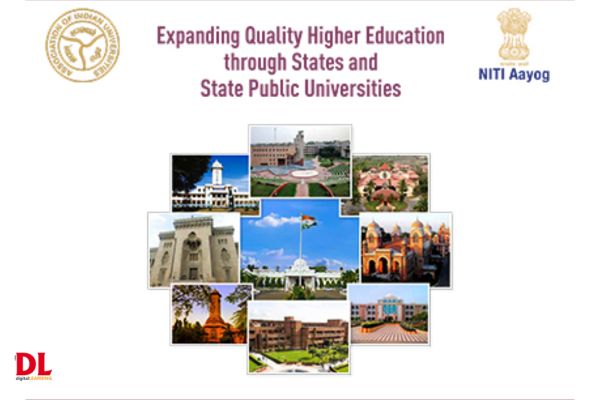
NITI Aayog has unveiled a comprehensive policy report titled ‘Expanding Quality Higher Education through States and State Public Universities’. The report, launched by Vice Chairman Suman Bery along with other senior officials, aims to address critical challenges in India’s higher education landscape, focusing on the role of State Public Universities (SPUs).
With 495 SPUs and 46,000 affiliated institutions accounting for 81% of student enrolment, these universities play a pivotal role in India’s higher education system. The National Education Policy (NEP) 2020 sets an ambitious target to increase higher education enrolment from 4.33 crore to 9 crore by 2035. The report underscores that enhancing the quality of SPUs is crucial for achieving the vision of Viksit Bharat 2047.
The report highlights the need for SPUs to move beyond their traditional role of providing access to higher education and evolve into globally competitive institutions. Key areas requiring attention include improving research quality, pedagogy, and financial sustainability while maintaining affordability and accessibility. The report calls for policy, regulatory, and fiscal interventions to enhance governance, curriculum design, and institutional infrastructure.
The report proposes a multi-pronged strategy with short, medium, and long-term policy recommendations across five core areas:
- Research & Development: Establishing research hubs, faculty training programs, patent cells, and R&D advisory committees to enhance innovation.
- Curriculum Enhancement: Implementing industry-linked curricula, periodic syllabus updates, and multidisciplinary education to meet evolving job market needs.
- Employability & Skilling: Introducing mandatory internships, entrepreneurship programs, and industry-academia collaborations to bridge the skill gap.
- Digitalisation: Leveraging technology through AI-driven student lifecycle management, digital learning centres, and tech-enabled classrooms.
- Internationalisation: Encouraging global collaborations, faculty exchange programs, and initiatives to attract international students.
To ensure sustainable funding, the report advocates for increasing education expenditure to 6% of GDP, as recommended by NEP 2020. It suggests establishing a dedicated infrastructure finance agency for SPUs, encouraging corporate social responsibility (CSR) investments, and piloting fee autonomy for select universities while ensuring scholarships for affordability.
On governance, the report recommends a shift from regulatory control to a facilitator model, strengthening State Councils for Higher Education (SCHEs), expediting faculty recruitment, and implementing transparent governance structures.
Recognising the need for stronger academia-industry linkages, the report proposes initiatives such as ‘Internship Banks’ to connect students with industry opportunities. It also calls for formal partnerships with industry bodies like CII, FICCI, and NASSCOM for research collaborations and faculty appointments of industry experts as ‘Professors of Practice’.
The policy document presents nearly 80 policy recommendations spanning governance, funding, quality enhancement, and employability. These insights are based on extensive consultations with 20 state governments, 50 SPUs, and key stakeholders in the education sector.
Also Read: Kerala to develop state-owned AI engine for schools under KITE’s leadership
NITI Aayog’s Vice Chairman Suman Bery emphasised that public universities globally, such as those in the U.S. and Brazil, set benchmarks for academic excellence. He urged Indian SPUs to align with global standards. NITI Aayog Member Dr Vinod Kumar Paul stressed that transforming SPUs is essential for India’s transition into a global knowledge powerhouse.
NITI Aayog CEO BVR Subrahmanyam reaffirmed that nearly 80% of India’s higher education will continue to be delivered through SPUs, making their reform crucial. The report serves as a strategic blueprint to complement NEP 2020 in strengthening India’s higher education system, thereby positioning SPUs at the forefront of national development.



















